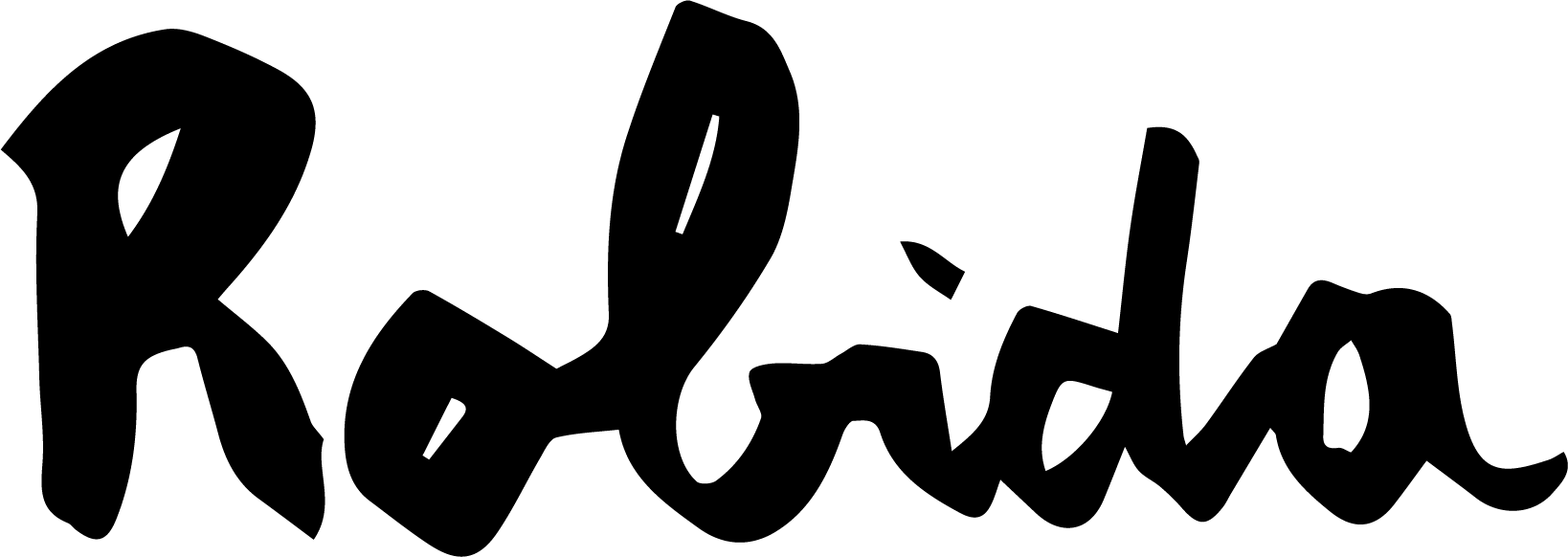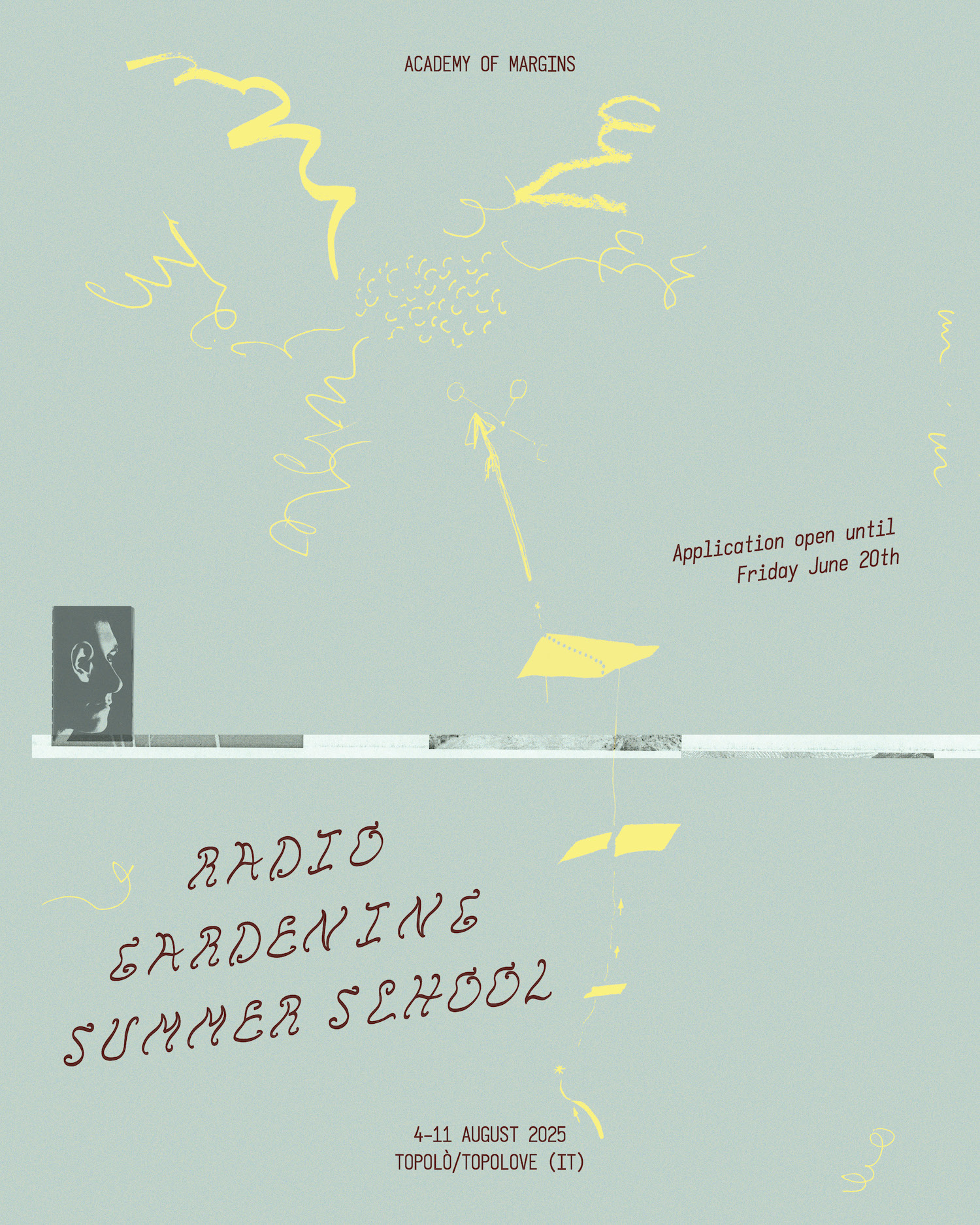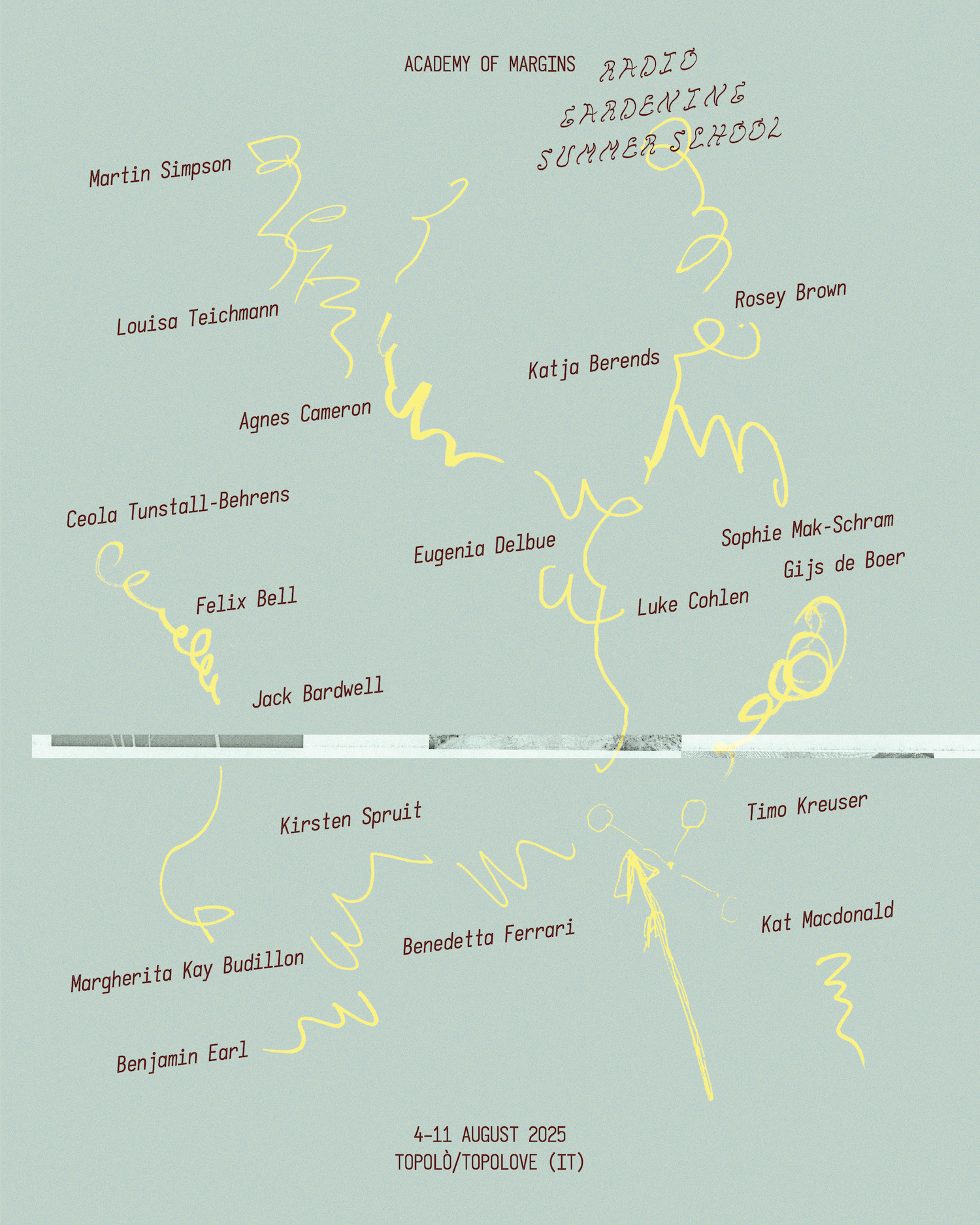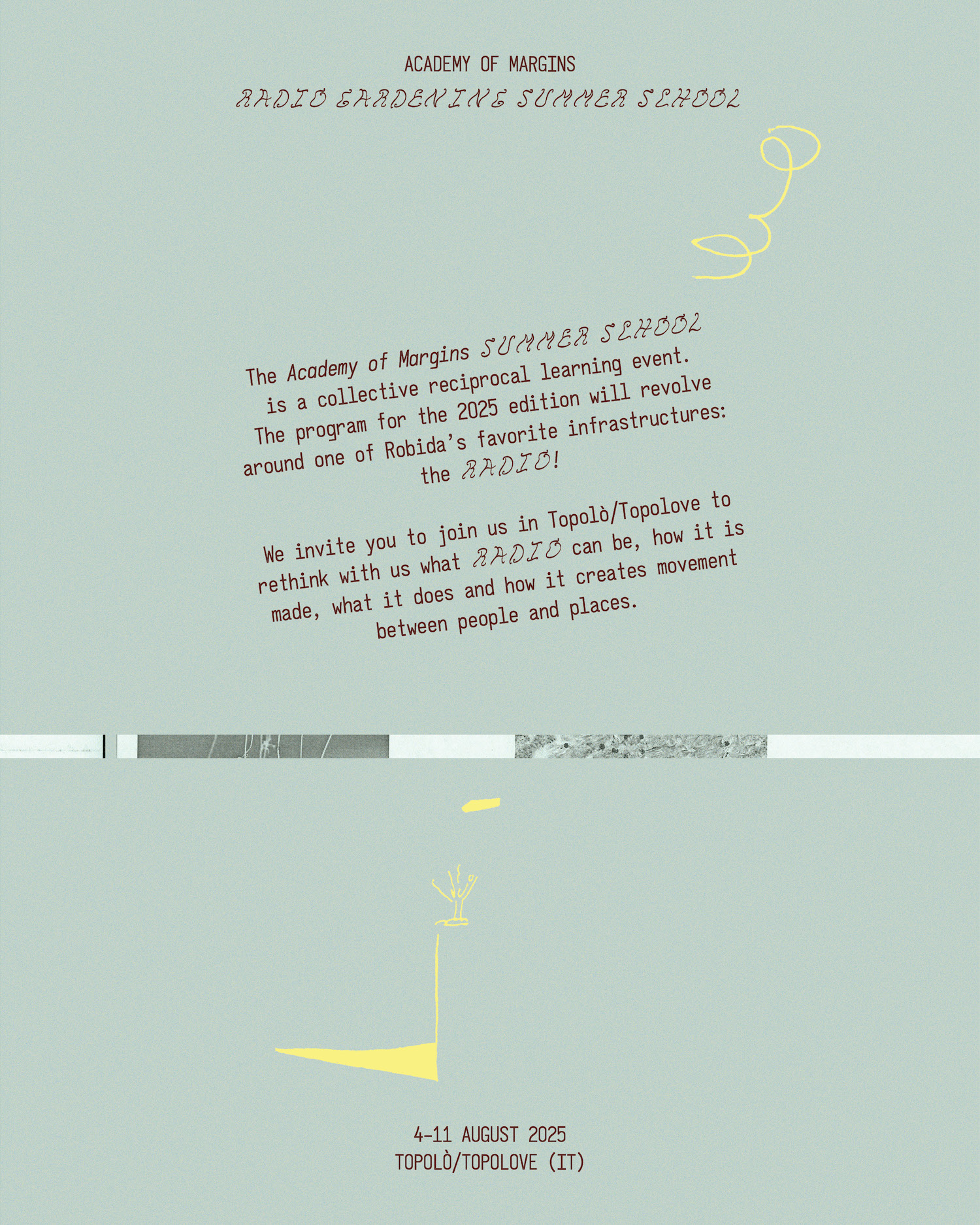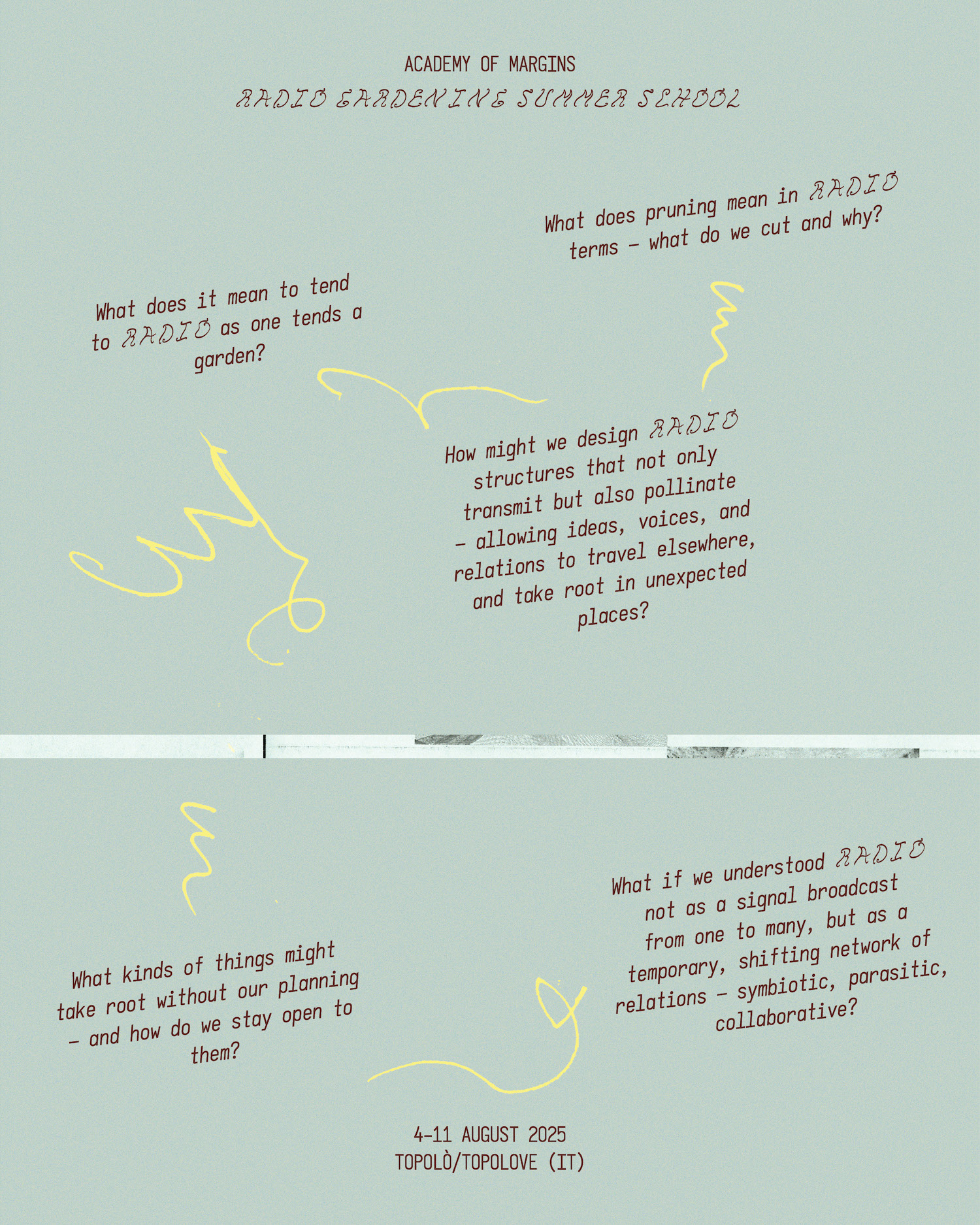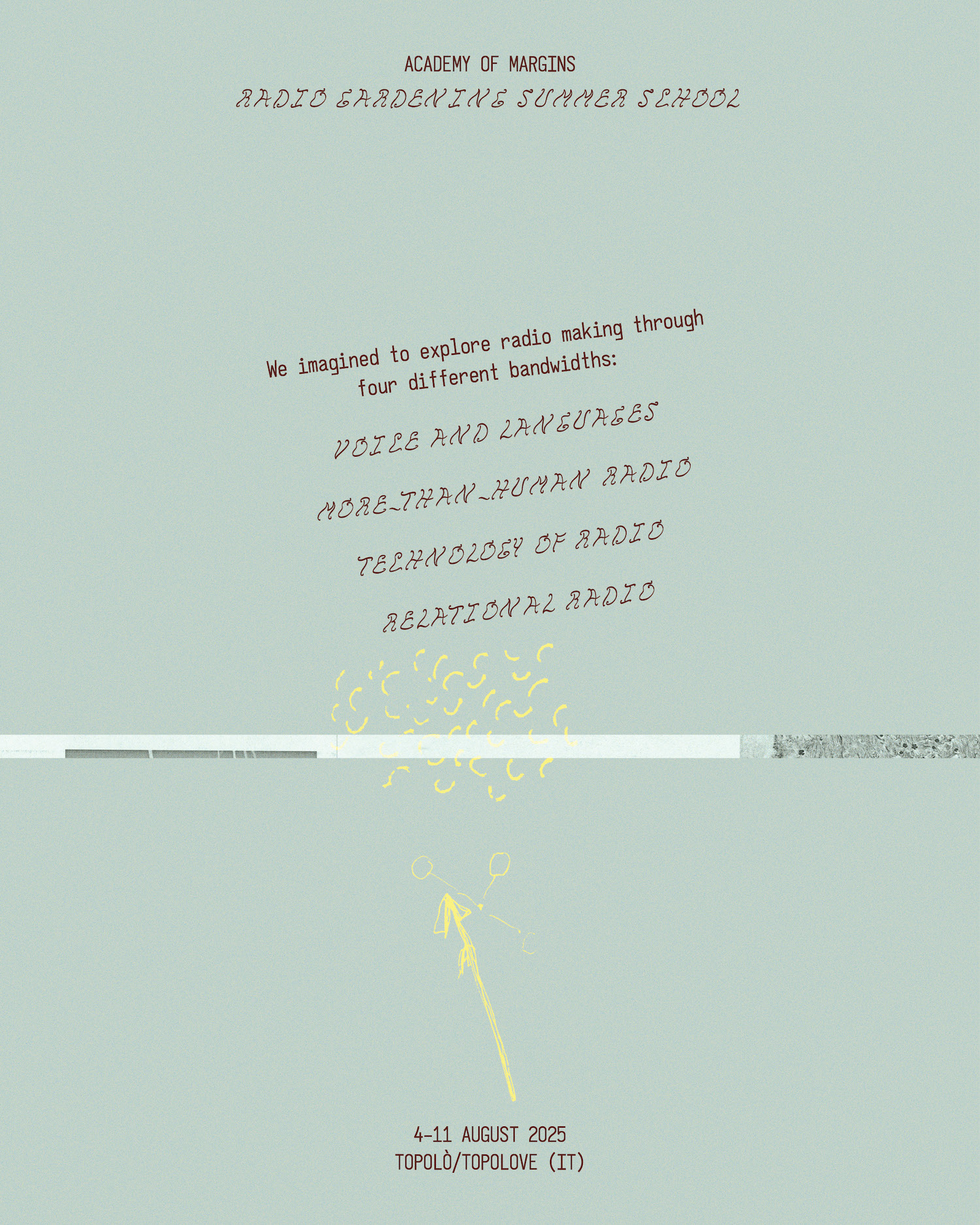Listen to us here:
radio.robidacollective.com
Check out what’s happening on August 9th and 10th — click here for the full program!
All events on these two days are public, open to everyone, and free of charge.
Scopri cosa succede il 9 e 10 agosto — clicca qui per il programma completo!
Tutti gli eventi in questi due giorni sono pubblici, aperti a tutti e ad ingresso libero.
Preveri, kaj se bo dogajalo 9. in 10. avgusta — klikni tukaj za celoten program!
Vsi dogodki v teh dveh dneh so javni, odprti za vse in brezplačni.
with Felix Bell ✼ Katja Berends ✼ Gijs de Boer ✼ Rosey Brown ✼ Agnes Cameron ✼ Luke Cohlen ✼ Eugenia Delbue ✼ Benjamin Earl ✼ Benedetta Ferrari ✼ Margherita Kay Budillon ✼ Timo Kreuser ✼ Kat Macdonald ✼ Sophie Mak-Schram ✼ Martin Simpson ✼ Kirsten Spruit ✼ Louisa Teichmann ✼ Ceola Tunstall-Behrens.
Click here to view the complete program of the Summer School!
Introduction: about the Academy of Margins
Robida is welcoming everyone to the 2025 program of the Academy of Margins.
The Academy of Margins is a long-term project started by Robida in 2022: it is conceived as a learning platform that stimulates collaborative and discursive learning and is based on intimacy and rootedness where the margins are not only the site but also the widely intended content of the Academy itself.
The Academy of Margins transforms Topolò into a learning site, where one can put in relation different knowledges brought to the village by researchers, professors, activists, artists who encounter the place and the landscape and are transformed by them. Contents are situated in the place, adapting to it, changing through it: the context ceases to be the scenery of learning, and becomes a participant to the development of reflections, questions and knowledge articulations.
The context: Radio Robida
Radio Robida was born from a deep need — the need to stay connected with our friends throughout the year, especially in the stillness of winter. And what better way than through the intimacy of the spoken word and sound? We began to wonder: how could we combine Robida’s fondness for hyper-specificity with a desire to remain meaningful for those who are far away? As we were already publishing one issue of the Robida magazine every year — a long and often slow process — we felt the need for another kind of medium. A medium that could be more spontaneous, immediate, and even carefree. That’s how the idea of an internet radio station came about. Instead of broadcasting widely, we chose to narrowcast — to send signals as if speaking into a walkie-talkie, or calling a friend you don’t always have anything to say to, but whom you call anyway. Just to let them know you’re there. Radio for us is a slow, ongoing attempt to tune into the rhythms of a place — and to share them, gently, with others. Radio as a means of cultivating relationships and communities. Where traditional broadcasting is about scale and mass reach, narrowcasting is about specificity and situatedness — values that align deeply with the way we work in Robida. For us, radio is not a performance, but a practice. Something quiet, consistent, and mundane — like watering a plant or brushing your teeth in the morning. We try to make the act of doing radio feel as effortless as possible, so that it becomes not an event, but a way of being together. In this way, the radio becomes a speculative infrastructure: not because it imagines a fixed alternative future, but because it performs a different kind of media temporality. One grounded in slowness, repetition, and ongoing experimentation. A place where things don’t need to conclude — where unfinished thoughts, hesitations, background sounds, noises, and silences are all valid forms of presence.
The topic: Radio Gardening1
This year, we invited participants to join us for the Summer School of the Academy of Margins in Topolò/Topolove on the theme of Radio Gardening — to rethink together what radio can be, how it is made, what it does and how it creates movement between people and places. Gardening, in this context, was not simply a metaphor, but a methodology. We drew inspiration from Kate Donovan’s conceptual parallel between radioing and gardening in her work Radio as Relation:
“A radio can be cultivated in much the same way as a garden: structures can be set in place to allow for ‘organic’ development, seeds can be sown, ground prepared, areas laid out, research made, pieces cut back or pruned, and there can be a sense of wonderment at how/which new—unfamiliar/ unplanned/ unexpected—seeds fly in on a breeze. […] The radio and the garden are similar in that they can both be considered as temporary networks; a garden is a complex inter-species network (with both parasitic and symbiotic tendencies) with trans-scalar effects, that is controlled (at least in theory), maintained and cultivated by humans—as is a technological radio network. Yet, we must admit that despite the often clear boundaries, both are also slippery figures in some aspects, and will always, to some extent, resist the hold of human control.”2
We ask ourselves: what does it mean to tend to radio as one tends a garden? What does pruning mean in radio terms — what do we cut and why? What kinds of things might take root without our planning — and how do we stay open to them? How might we design radio structures that not only transmit but also pollinate — allowing ideas, voices, and relations to travel elsewhere, and take root in unexpected places? What if we understood radio not as a signal broadcast from one to many, but as a temporary, shifting network of relations — symbiotic, parasitic, collaborative?
The program and concept of this year’s summer school is curated by us, Robida collective, and our close friend Jack Bardwell, who helped us establish Radio Robida in 2021.
The Summer School on Radio Gardening will offer time and space to explore these questions together. As in previous editions, we invited participants to apply to the Summer School by proposing activities, workshops, lectures, experiments, presentations, or discussion formats that explore the practice, theory, and politics of radio. While the theme of Radio Gardening offers a loose conceptual frame, the emphasis is on radio as a tool for listening, communicating, and organising. We welcome both theoretical contributions and hands-on formats, and we encourage proposals that combine the two.
1 The term is borrowed from radio artist and researcher Kate Donovan, who used it in 2018 for the project Datscha Radio, which explores the intersection of gardening and radio art. Later it became the title of a project by the artist Monaí de Paula Antunes.
2 Kate Donovan, Radio as Relation. Listening across worlds of artistic research, technologies and the more-than-human. PhD Dissertation, Potsdam University, 2025.
Bandwidths
1. Voice & Languages
What might it mean to treat language as a living garden of signs and signals? Can we unearth the tropes of radio’s past — the announcer’s perfect diction, the jingle, the read word — and deconstruct them into new forms of expression?
Radio has always been a technology of the voice — modulated, intimate, disembodied — and yet in its linguistic forms, it is never neutral. Voices arrive shaped by geographies, histories, genders and dialects. This category invites proposals that explore the vocal and linguistic dimensions of radio-making. From radio dramas and polyphonic sound poetry to experiments in translation, code-switching, stammering, singing and other experimental vocal practices, we are interested in how radio becomes a space to inhabit and crack language.
2. More-Than-Human Radio
How do we tune into worlds that do not speak in words?
This category turns the microphone downward or upward toward the more-than-human realm. What does it mean to listen with and through the forest, the fungus, the drone of pollinators, the slow frequencies of stones and soil? We’re looking for practices that dwell in the friction between the audible and the inaudible: field recordings, ecological phonologies, microphone experiments, sound walks, and techniques for listening to what resists being heard.
3. Technology of Radio
What is radio really made of?
Radio is infrastructure par excellence, “matter that enables the movement of other matter”. In this category, we explore the technical and material dimensions of radio, but at the same time understanding radio-as-technology as a field of political, spatial and aesthetic possibilities. We are interested not only in how to build a station from scratch, claim a frequency, or set up a signal that only reaches across a garden or a village, but also in the history of practices that subverted the medium to work otherwise and transmit counter-hegemonic or marginalised narratives. The invisible signals that surround us daily and enable our access to both analogue and digital worlds—wifi, bluetooth, GPS, remote controls—are all part of the broader radio spectrum, and open up further questions about how radio infrastructures structure everyday life, and how they might be repurposed, hacked, or reimagined.
4. Relational Radio
How can radio support local and trans-local communities, permanent and temporary communities?
From its beginnings, Radio Robida was created to form a collective presence with the people in Topolò but also our trans-local community. We truly believe that radio is first and foremost a relational practice: a space where conversations, readings, music, even silence become a medium for community-making. We are interested in proposals that approach radio as an act of being- and learning-with, through performative acts, live gatherings, parties, improvised compositions, radio dinners, shared listenings, or late-night chats that generate a sense of place and home.
Modalities: Learning-With
In the second edition of the Summer School of the Academy of Margins, we decided to try to develop and put into action the concept of learning-with, the concept first proposed to us by our friend and colleague Michael Marder.
This with has multiple interpretations. Firstly, it is the antonym of the proposition without, which is so characteristic of the standard pedagogical process. The sterile classroom is only one of its withouts: it puts the one who learns out of the context of everyday life, in which — so it seems — learning does not and cannot take place. As if learning is one of the multiple modes of our being in which a human subject can put itself into, modes which are strictly separated from one another. But learning-with “is not a predominantly mental function, but a ‘movement’ of life, involving the human subject as a whole and in relation to the various environments that constitute the ecological world,” wrote authors Carvalho, Steil and Gonzaga in their article Learning from a more-than-human perspective. Plants as Teachers (2020).
But the with also opposes the proposition from, as in learning-from, the method which clearly assumes that there is an essential opposition between the student and the teacher, the opposition which perpetuates the power relations imposed on subjects by the standard pedagogical process. Learning-with, on the other hand, means — as Fred Moten and Stefano Harney write in their The Undercommons: Fugitive Planning & Black Study (2013) — to be “committed to the idea that study is what you do with other people. It’s talking and walking around with other people, working, dancing, suffering, some irreducible convergence of all three, held under the name of speculative practice. […] The point of calling it ‘study’ is to mark that the incessant and irreversible intellectuality of these activities is already present.” There is no call to order in learning-with, no interpellation into teachers and students, activity and passivity, spaces of study and spaces of mere being.
At the fourth edition of Robida’s Summer School, we continue to propose making the participants into students and teachers at the same time. But learning-with is not only a simple gesture of dismantling this binary opposition, but a context, that provides a way of forming a new possible subjectivity, which is open to contaminations from outside — other participants, the environment, the landscape and its human and non-human inhabitants; it is a context, as famously wrote Moten and Harney, “where people sort of take turns doing things for each other or for the others, and where you allow yourself to be possessed by others as they do something.” Being possessed by others, their otherness and particular personalities, everyday practices, eating habits, choice of words, ticks, even — this is what we call learning-with.
Programme
Monday 04.08.2025
Morning: Walkie-Talkie Lie down and Listen
curated by Jack Bardwell
Two pieces of metal attached to a wooden stick, a black vine coils its way down to a small box. It could be a peculiarly placed garden tool. It’s all that is needed to send an invisible doughnut of waves cascading down the hills. Invisible waves carrying the audio activity of the summer school.
This micro-power radio station is part of a looping audio ecology that connects the participants to each other, the landscape and the wider Robida community.
Walkie-talkie radios, given to all participants allow us to communicate happenings and organise on the fly while also listening live to the stations activity without relying on the temperamental local internet connection.
The walkie-talkies will be connected back to the radio which in turn will be broadcast as a channel on the Robida website, allowing the wider community to listen in real time to what grows from this infrastructural intervention.
Late morning: Becoming-Radio: a walk to the antenna on Kuk mountain
curated by Robida
After setting the antenna on the roof of the chiosco, we’ll continue our tuning with a walk to Kuk — a ridge on Kolovrat, marked by the presence of a towering antenna that has long sent signals across borders and valleys. We go there not to conquer a peak, but to meet this monumental infrastructure — to stand near it, beside it, beneath it. To listen with our bodies. To feel what it means to be close to a machine made for reaching far.
Becoming-Radio is a walk into transmission: the body as antenna, the mountain as signal, the group as a temporary network. A chance to think not just about broadcasting, but about presence, proximity, and porousness.
Afternoon: Pirate Radio: A collective lecture
curated by Sophie Mak-Schram and Rosey Brown
Pirate radio was a vital tool of resistance, community and identity building across the 20th century, when state regulations begin to manage airwaves. From linguistic autonomony through to banned music and activist organising, we're interested in what functions pirate radio might still have for hyperlocal approaches to radio today.
Thinking with a longer history of broadcasting as a form of building relationships, communities and futures, we'll work together to collate what we know, hope to know and dream to be true of pirate radio. Together, we'll produce a collective lecture telling the many possible stories - past, present or future - of pirate radio from across our experiences and local knowledges.
Evening: Presentation of the Summer School website
curated by Kirsten Spruit and Benjamin Earl
How to make a website for radio that is site- and time-specific?
For this year’s summer school, we expanded the Robida website by creating a dedicated online listening space, specifically for the radio. Questioning the defaults and conventions within internet radio, we wondered:
Isn’t it strange how you tune into an internet radio stream by clicking play, as if you start the broadcast rather than join in on something that is already happening? Instead of showing the playtime of the individual user, can we emphasise the place in time within the entire broadcast?
How can we bring a remote audience into a site-specific, ongoing broadcast that portrays the passage of time as well as the activity and life of that space? Can we create an online space for a collective experience?
For the occasion of this weeklong, 24/7 broadcast, we attempted to create a tool for those broadcasting to announce specific moments in between the ambient noise, whether scheduled in advance or happening spontaneously. Working with a lightweight set-up, using are.na and telegram channels as means to update the content, we aimed to create a dynamic space for both ends of the signal — a website that can be easily adapted to whatever may happen throughout the week…
Tuesday 05.08.2025
Early morning: Sound Windows
curated by Gijs de Boer
I've been filming window views for a while. What fascinates me is how you can read windows as isolation regret, architectural nostalgia. We created a safe inside, but now miss the outside, thus the window. A boundary negotiation that plays out a separable self, cut off from the relations that produced it, looking back longing. Houses have windows for longing eyes but not ears. What would that sound like?
In three sessions with smaller groups, each on a different spot and time of day, we'll make a Sound Window. We'll gather in front of an open window and try to gather sounds of longing, as a way to explore more relational boundary negotiation.
Early morning: On Soundings
curated by Ceola Tunstall-Behrens
Throughout the week we will explore the surrounding landscape of Topolò by listening and sounding. Inspired by the deep listening practice of Pauline Oliveros, we will exercise and awaken our ears and voices collectively. We will listen outwards and take our awareness inwards, to the resonant areas of the body.
Morning: What if These Trees Could Speak?
curated by Felix Bell
Trees exist on a vastly different timescale than humans. Rooted in place, they sense only their immediate surroundings – though connected distantly through fungal networks. This static grounding contrasts sharply with our mobility, making trees profound witnesses to a hyper-local world. What if these trees could speak? I will merge material experimentation and attentive listening to reimagine coexistence. Guided by Despret and Haraway’s call for a ‘Phonocene’—an era where listening becomes survival —we craft analog devices (paper resonators, wooden stethoscopes) to amplify the unheard phonocene of trees.
Afternoon: Multi-Band Excitation
curated by Kat Macdonald and Agnes Cameron
Following on from Fanon’s description of the Voice Of Free Algeria as enabling “an autonomous creation of information”, we plan to explore the fragmentary nature of radio as a messaging system that is both shaped by and defining of physical and social space. To do this we will be running a radio transmitter building workshop, as the basis for a participatory installation work.
Through this, we will explore the materiality of radio and its interactions with the landscape, along the invisible borders constructed by broadcast ranges. We want to highlight a model of listener that is ‘active’ rather than ‘passive’, encouraging participants to gather and work with one another to piece together a collective narrative of a broadcast.
This will be done through multiple simultaneous broadcasts, each fragmenting and obscuring the narrative, with each participant only allowed a single receiver, requiring collaboration and conversation to observe a complete image of the piece.
Wednesday 06.08.2025
Early morning: On Soundings
curated by Ceola Tunstall-Behrens
Early morning: Weeding and Reading
curated by Robida
At daybreak, we meet on the paths of Topolò — once cleared by hand, season after season, by the villagers — to continue a gesture of care.
One reads aloud from the collective reader. Others listen, hands in the cracks between the stones, pulling weeds from the paths.
Weeding and Reading is a shared rhythm of attention — to the landscape, to thought, to one another. A slow morning choreography of maintenance and meaning-making.
Morning: Rituals for a Relational Language
curated by Katja Berends and Luke Cohlen
We propose an exploration of radio as a method for extending solidarities and researching its political potential by combining sonic and text-based practices. Can radio be a tool to prefigure another set of relations, transcending hyper-individualist modes of being? How can we, despite structural dissonances and differing social rhythms, come together to create a relational language through collective radio plays and readings? And could radio foster any material change?
Drawing on the dialogic practice outlined by Lucia Farinati and Claudia Firth in The Force of Listening, we understand listening as a political act. During the summer school, we would like to experimentally engage with these politics of speaking-listening through a series of iterative radio experiments. In these, we will collectively read aloud (parts of) texts from the collective reader, alongside other complementary writings—reflecting on the topics and how the texts resonate with one another. These recorded gatherings may then enter into dialogue with sounds, conversations, and other materials generated on-site by the group, together forming a situated narrative to broadcast afterwards.
Afternoon: Of Practices within Evanescence
curated by Margherita Kay Budillon and Eugenia Delbue
The project consists in remote voice-guided somatic exercises to be experienced alone open air in the landscape, but shared across space through radio, exploring dislocated intimacy and free of expression. The instructions for the exercises recorded or broadcasted live allow anyone to immerse themselves in body practice, guided by an embodied and evocative language. In the terminological and syntactic choices, the selection and juxtaposition of calibrated words allow the listener to discover the dynamics of sensitivity in response to a particular expression, the effectiveness of metaphor and the imaginative vitality of language: the aim is to create an evocative language that can accompany both the body and the imagination, and to compose linguistic expressions that seek a balance between precision and instructions for action with openness and invitation to exploration. The exercises are a selection of performative practices deriving from the living artist Fiorenza Menni's pedagogical practice.
Evening: Sound Windows
curated by Gijs de Boer
Thursday 07.08.2025
Early morning: On Soundings
curated by Ceola Tunstall-Behrens
Early morning: Weeding and Reading
curated by Robida
Morning: Listening to the Trees, to the River, to the Birds, to the House …
curated by Timo Kreuser
Listening to the trees, to the river, to the birds, to the house … is a radiophonic sound piece in and around Topolò in which the close nature, the trees, the river and abandoned houses are converted into small permanently broadcasting experimental radio stations. Equipped with mics and transmitters, they function as ears listening into the surrounding environment, all transmitting their findings on the same frequency to a close parameter of reception. In approaching and walking amongst them with a radio, one can listen into the crackling, the small feedbacks and naturally scanning bandpass filters, environmental sounds, naturally occurring radio waves and the ever changing breeze of white noise, which are sounding all too much like what radio produces in accidental and collateral sounds and noises, if it isn’t receiving clearly — just, it isn’t.
The radio and the village are merged into a hybrid which infests either the ether and the environment.
Afternoon: 868 MHz
curated by Louisa Teichmann
868 MHz is a hybrid reality game running on the same standardized frequency as the LoRa gateways of The Things Network. Many cities world-wide are in the process of building an Urban Data Platform (UDP), a sort of mirror world of real-time data collected in public space via smart devices. A major facilitator of this development is The Things Network, a global IoT Network connecting thousands of sensors through long range radio transmission. From lamp posts to advertisement screens, sourced information is not only collected, but can be processed and fed back into the city streets to adjust spaces and manipulate citizens' movement through them. 868 MHz suggests a player's mod of this framework of scattered, hidden devices feeding into one central server. In its new edition, 868 MHz will be reimagined within the context of Topolò, drawing on the history of smuggling along the Italy–Slovenia border.
Evening: A Graph of an Activity Now Stilled: On signals as long-lost fragmentary evidence
curated by Benedetta Ferrari
Departing from the ‘Wow! Signal!’, the idea of ongoing communication with extraterrestrial intelligence convinced us that a dialogue was possible. But even if we were to detect life in a nearby star, its signals might take centuries to reach us. Rather than a dialogue, extraterrestrial communication unfolds as a monodirectional transmission, constrained by the immense spatiotemporal distances that separate us. Like archaeologists working with temporal fragments, astronomers attempt to dialogue with life separated by vast expanses of space and time. The astronomer’s position is the historian’s date; his velocity is our sequence; orbits are like durations; perturbations are analogue to causality.
By asking: What can we learn at a distance? And what can we learn by reconstructing from potentially long-lost fragmentary evidence? A Graph of an Activity Now Still is a nocturnal lecture on astronomy and archaeology as twin practices that dig into the past and reconstruct narratives from fragmented signals. The astronomer and the historian both deal with past events perceived in the present; they both collect ancient signals into compelling theories about distance and composition.
Friday 08.08.2025
Morning: On Soundings
curated by Ceola Tunstall-Behrens
Afternoon: Sound Windows
curated by Gijs de Boer
Afternoon: Place-Based Music
curated by Martin Simpson
An invitation to explore environmental music making in an outdoor location near Topolò. The practice involves a journey, location scouting. The experience is better shared, an encounter between (at least) two and their environment. Going together, stopping along the way, appreciating affordances of the places in-between. Lakes or the river nearby are good directions. On finding a suitable spot, a sit on the ground, a step in the water, observing the ripples and lapping and bent light and birdsong and the wind through crisped leaves. What could we possibly add to this? What could we possibly leave? We practice carefully improvising, communicating through a playful sounding, attending to what resounds. Last time, a woodpecker joined in, a throat croaked. Moist breath played clusters in a solar synthesizer, fading in and out depending on warmth and wind, a cloud passed over, and the beating rhythm sped up…
Afternoon and evening Preparation for the public days
curated by Robida
Saturday 09.08.2025 – public day
During the day
How does a radio grow?
whole day radio broadcast on: radio.robidacollective.com
21.00, cinema
Field Studies
concert by Glauco Salvo
Sunday 10.08.2025 - public day
10.00, house Jakuližova hiša
Tuning the Body
facilitated by Barbara Stimoli
{in English & Italian}
16.00, house Juljova hiša
Multi-Band Excitation
installation by Kat Macdonald & Agnes Cameron
{in English}
16.00, house Juljova hiša
Of Practices within Evanescence
sound walk by Margherita Kay Budillon, Eugenia Delbue
{in Italian}
17.00, house Jakuližova hiša
Radios on the Edge
conversation between Radio Onde Furlane, Radio Študent, Radio Robida
{in Italian, Friulian, Slovene and English}
at dusk, house Pihuova hiša
Soundings
performance by Tisa Neža Herlec and Ceola Tunstall-Behrens
afterwards, Izba
collective dinner
with darkness, cinema
Fiume o morte!
film by Igor Bezinović
In collaboration with Kinoatelje and the project Travelling Cinema Soča–Isonzo Cinema Itinerante.
Partner / Partnerji / Partners
Dvojezična večstopenjska šola P. Petričič
Informazione Friulana soc. Coop. (Radio Onde Furlane)
Radio Študent
La Foresta – Accademia di comunità ETS
Ammirato culture house (Free Home University)
In collaborazione con / V sodelovanju z / In collaboration with
Associazione/Društvo Topolò-Topoluove per l'utilizzo della Juljova hiša
Topolò, i suoi abitanti e i suoi boschi.
La summer school dell'Accademia dei margini è un progetto di Robida supportato da Regione Friuli Venezia Giulia e Ufficio per gli sloveni nel mondo e oltreconfine del governo sloveno. L’edizione di quest’anno fa parte del progetto The Other Radio, inserito nel Programma Ufficiale di GO! 2025 – Capitale Europea della Cultura.
Poletna šola Akademije margin je del projekta Akademija margin za leto 2025, ki nastaja ob finančni podpori Dežele Furlanije - Julijske krajine in Urada Vlade republike Slovenije za Slovence v zamejstvu in po svetu. Letošnja edicija pa nastaja v sklopu projekta Radio drugega/The Other Radio iz Uradnega programa EPK GO! 2025.
The Academy of Margins program is funded by the Region of Friuli Venezia Giulia and the Office of the Government Office for Slovenians Abroad. This year's edition is part of the project Radio drugega / The Other Radio, included in the Official Programme of GO! 2025 – European Capital of Culture.


